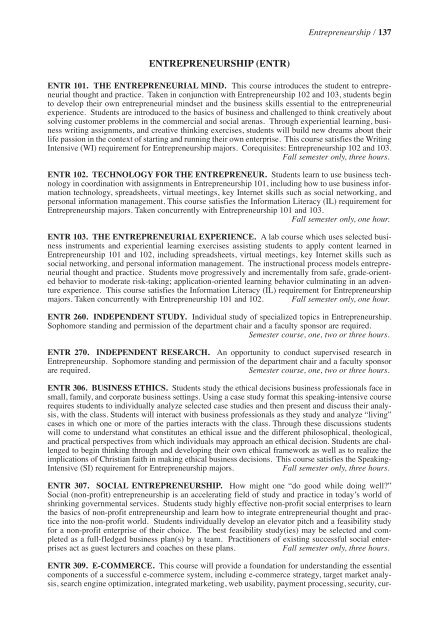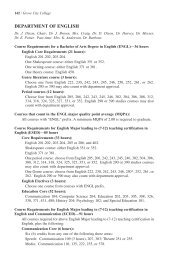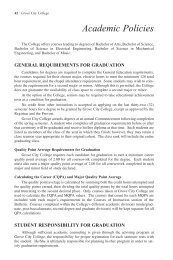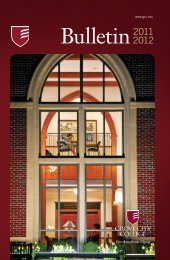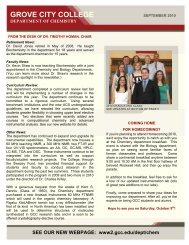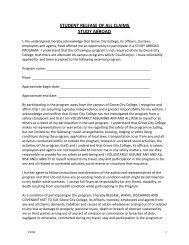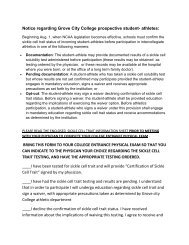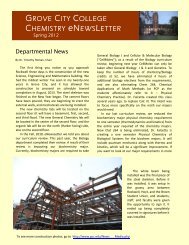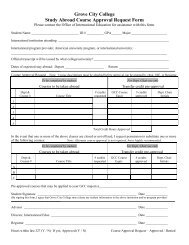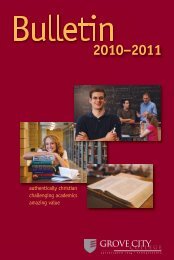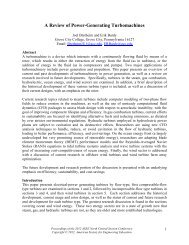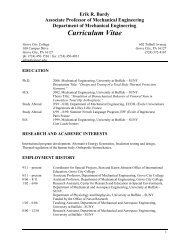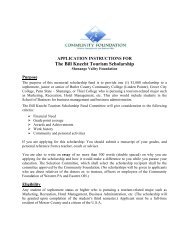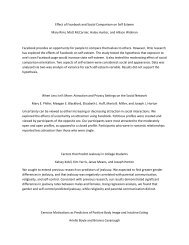2009–2010 - Grove City College
2009–2010 - Grove City College
2009–2010 - Grove City College
Create successful ePaper yourself
Turn your PDF publications into a flip-book with our unique Google optimized e-Paper software.
ENTREPRENEURSHIP (ENTR)<br />
Entrepreneurship / 137<br />
ENTR 101. THE ENTREPRENEURIAL MIND. This course introduces the student to entrepreneurial<br />
thought and practice. Taken in conjunction with Entrepreneurship 102 and 103, students begin<br />
to develop their own entrepreneurial mindset and the business skills essential to the entrepreneurial<br />
experience. Students are introduced to the basics of business and challenged to think creatively about<br />
solving customer problems in the commercial and social arenas. Through experiential learning, business<br />
writing assignments, and creative thinking exercises, students will build new dreams about their<br />
life passion in the context of starting and running their own enterprise. This course satisfies the Writing<br />
Intensive (WI) requirement for Entrepreneurship majors. Corequisites: Entrepreneurship 102 and 103.<br />
Fall semester only, three hours.<br />
ENTR 102. TECHNOLOGY FOR THE ENTREPRENEUR. Students learn to use business technology<br />
in coordination with assignments in Entrepreneurship 101, including how to use business information<br />
technology, spreadsheets, virtual meetings, key Internet skills such as social networking, and<br />
personal information management. This course satisfies the Information Literacy (IL) requirement for<br />
Entrepreneurship majors. Taken concurrently with Entrepreneurship 101 and 103.<br />
Fall semester only, one hour.<br />
ENTR 103. THE ENTREPRENEURIAL EXPERIENCE. A lab course which uses selected business<br />
instruments and experiential learning exercises assisting students to apply content learned in<br />
Entrepreneurship 101 and 102, including spreadsheets, virtual meetings, key Internet skills such as<br />
social networking, and personal information management. The instructional process models entrepreneurial<br />
thought and practice. Students move progressively and incrementally from safe, grade-oriented<br />
behavior to moderate risk-taking; application-oriented learning behavior culminating in an adventure<br />
experience. This course satisfies the Information Literacy (IL) requirement for Entrepreneurship<br />
majors. Taken concurrently with Entrepreneurship 101 and 102. Fall semester only, one hour.<br />
ENTR 260. INDEPENDENT STUDY. Individual study of specialized topics in Entrepreneurship.<br />
Sophomore standing and permission of the department chair and a faculty sponsor are required.<br />
Semester course, one, two or three hours.<br />
ENTR 270. INDEPENDENT RESEARCH. An opportunity to conduct supervised research in<br />
Entrepreneurship. Sophomore standing and permission of the department chair and a faculty sponsor<br />
are required. Semester course, one, two or three hours.<br />
ENTR 306. BUSINESS ETHICS. Students study the ethical decisions business professionals face in<br />
small, family, and corporate business settings. Using a case study format this speaking-intensive course<br />
requires students to individually analyze selected case studies and then present and discuss their analysis,<br />
with the class. Students will interact with business professionals as they study and analyze “living”<br />
cases in which one or more of the parties interacts with the class. Through these discussions students<br />
will come to understand what constitutes an ethical issue and the different philosophical, theological,<br />
and practical perspectives from which individuals may approach an ethical decision. Students are challenged<br />
to begin thinking through and developing their own ethical framework as well as to realize the<br />
implications of Christian faith in making ethical business decisions. This course satisfies the Speaking-<br />
Intensive (SI) requirement for Entrepreneurship majors. Fall semester only, three hours.<br />
ENTR 307. SOCIAL ENTREPRENEURSHIP. How might one “do good while doing well?”<br />
Social (non-profit) entrepreneurship is an accelerating field of study and practice in today’s world of<br />
shrinking governmental services. Students study highly effective non-profit social enterprises to learn<br />
the basics of non-profit entrepreneurship and learn how to integrate entrepreneurial thought and practice<br />
into the non-profit world. Students individually develop an elevator pitch and a feasibility study<br />
for a non-profit enterprise of their choice. The best feasibility study(ies) may be selected and completed<br />
as a full-fledged business plan(s) by a team. Practitioners of existing successful social enterprises<br />
act as guest lecturers and coaches on these plans. Fall semester only, three hours.<br />
ENTR 309. E-COMMERCE. This course will provide a foundation for understanding the essential<br />
components of a successful e-commerce system, including e-commerce strategy, target market analysis,<br />
search engine optimization, integrated marketing, web usability, payment processing, security, cur-


